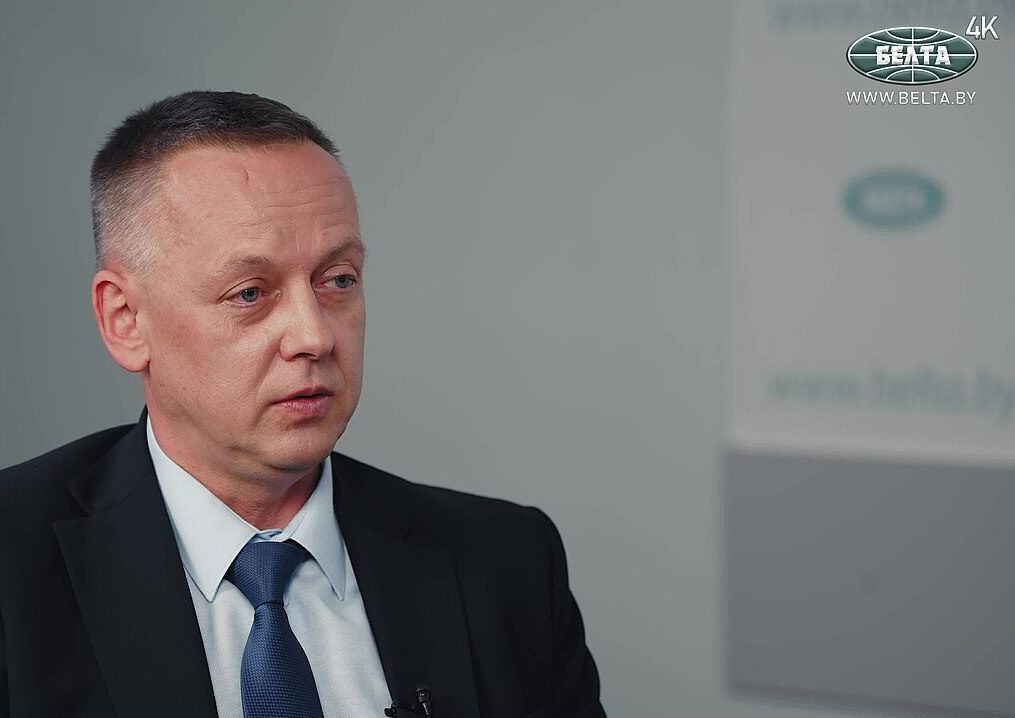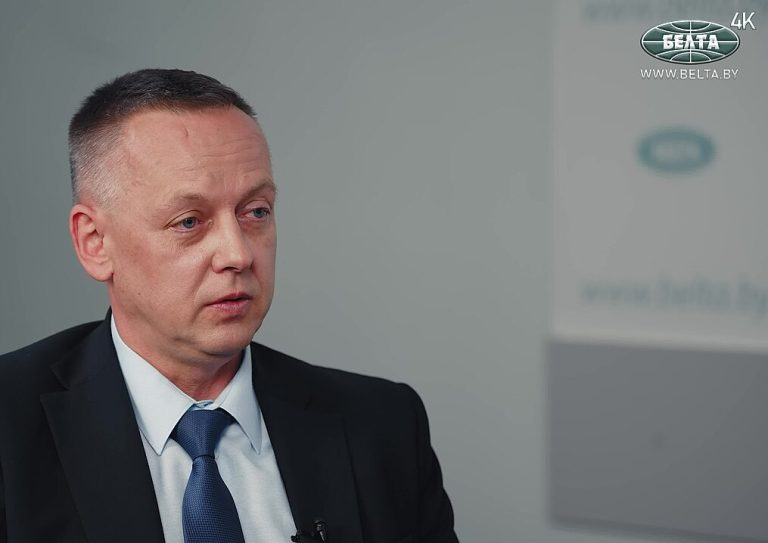Photo: BelTA, via Wikimedia Commons 2024-11-13
Photo: BelTA, via Wikimedia Commons 2024-11-13
Tomasz Szmydt, a former high-ranking Polish judge, fled to Belarus in May this year. There, he applied for asylum under President Aleksandr Lukashenko’s regime. Szmydt, who previously had access to classified EU and NATO materials, has later established the Prawda Polska Foundation (Polish Truth Foundation) in Minsk. Through this foundation, he aims to strengthen ties between Russia, Belarus, and other Slavic nations – essentially serving the Kremlin’s interest.
“The Foundation was set up, among other things, to tell about European and American politicians, their ties with the intelligence services and corruption,” per a September article on Szmydt by the Belarusian national news agency BelTA. He has openly confirmed the creation of this organization, the mission of which, he claims, is to promote good neighborly cooperation. Szmydt’s goals are considerable: he wants to create an international media platform available in Russian, Belarusian, Polish, English, and German. “Of course, the Polish truth will be heard in Poland itself. The secret services already know about it, and so do the people. But they will hear about it not only in Poland,” he said, a wink at future plans to publish for an international audience.
Secret information
There is concern regarding the extent of confidential information Szmydt had access to as a judge and member of the Polish Ministry of Justice before fleeing to Belarus. During his time at the Administrative Court in Warsaw, he worked in the second judicial division, which handles matters related to the protection of classified information and security clearances. Szmydt was responsible for deciding who would have access to confidential information with varying levels of classification. He was also involved with security clearances for Polish members of the armed forces, police officers, and national security officers operating within the EU and NATO.
In May 2017, he joined the Ministry of Justice, where he quickly climbed the career ladder thanks to a promotion from Judge and then-Under Secretary of State Łukasz Piebiak. This meant that he also had access to classified information within the ministry, granted to him personally by then-State Secretary and PiS (Law and Justice) politician Michał Wójcik.
What is the Polish truth?
“As you know, I have been in Belarus for six months. (…) I have accounts on X and Telegram, but this is not enough for information to have an impact on internal affairs, political affairs, on relations between Belarus, Russia and Poland. In my opinion, this should be done through the foundation,” the former judge said in an interview with BelTA. We now know the foundation he was describing is the Minsk-based Prawda Polska Foundation. Although its creation was only widely reported after a recent press conference, records from the Belarusian Ministry of Taxes and Duties show that it was established as early as June 10 this year — that is, only about a month after Szmydt’s arrival in the country. This may indicate that he was cooperating with Belarusian contacts before he’d even arrive.. “I think the Belarusian regime will use him as a propaganda tool to criticize European politics. It looks like that Szmydt is already working for the Belarusian state news agency BelTA,” Alexander Yarashevich, an exiled Belarusian investigative journalist at Buro Media, told Investigace.cz. We also contacted Szmydt for a statement, but he did not respond.
Immediately after news of his foundation became public, the former judge launched an intensive media tour, during which he enthusiastically shared details about his Foundation. At the same time, he also said that his intention was to unite the local Polish population in Belarus. He does not plan to return to Poland, however, not only because he doesn’t feel safe there, but also because of the alleged restriction on freedom of speech in the country. He says that only the Belarusian government can provide him with protection, freedom of opinion, and professional development. Political scientist Edit Zgut-Przybylska, however, painted a much less optimistic scenario for his future career: “Minsk will use him for as long as it needs him, and then probably drop him like others in the past, having squeezed everything out of him,” she told Visegrad Insight.
When Szmydt talks about the Polish population in Belarus, he is referring to the second largest ethnic community in the country (after the ethnic Russian population). Members of the Polish community, which various sources say make up somewhere between three to twelve percent of the total Belarusian population, are represented by the Union of Poles in Belarus (ZPB). The Polish minority has a long history in the country, which took a turn in 2020, after the fraudulent presidential election “won” by incumbent President Alexander Lukashenko.
The former Polish government did not recognize the results of the Belarusian election. Poland was also one of the countries that openly supported the Belarusian government-in-exile, the United Transitional Cabinet of Belarus, headed by Sviatlana Tsikhanouskaya, who was Lukashenko’s opponent in the 2020 presidential contest. Following the outbreak of civil protests after the elections, the security services began mass arrests. Among the citizens arrested were 68 journalists and other media personnel, including Polish nationals. Two of them, photojournalist Witold Dobrowolski and student Kacper Sienicki, confirmed after their release that they had experienced violence and humiliation at the hands of the law enforcement.
In March 2021, the Belarusian regime also imprisoned two ZPB members, journalist Andrzej Poczobut and ZPB chairwoman Andżelika Borys, on charges of “incitement to hatred” and “rehabilitation of Nazism.” Borys was released last year, but Poczobut still remains in prison after being sentenced to eight years and added to the list of “terrorists ” by the KGB.
Discrediting judges and harassing a journalist
Szmydt began his judicial career back in 2001 at the District Court in Ciechanów, a city in northeastern Poland. He rose through the ranks, moving from the position of regular judge to become a judge at the Administrative Court in Warsaw and eventually at the Supreme Administrative Court. Despite his high judicial salaries, he was in a difficult financial situation. For example, his asset declaration for 2022 shows that he did not own any real estate or have any savings. His only asset was a 2015 Seat Ibiza car, and he had debts worth almost PLN 584k (equivalent to over €135,000).
During his time in the courts, he was involved in the so-called hater affair (afera hejterska) along with his then-wife Emilia Szmydt and several other politicians from the Ministry of Justice. This consisted of an attempt to discredit and denigrate Polish judges who, under the PiS government, tried to protest against systematic political efforts to undermine the independence of the courts.
They tried to intimidate these politically inconvenient judges and deprive them of their mandates by harassing them with legal threats and publishing their personal information. Szmydt publicly admitted to his actions in 2022: “It’s not that I’m not ashamed of it, because I am ashamed, but I decided to talk about it publicly, even though it’s not easy,” he told in a TVN24 interview, during which he also apologized to the aggrieved judges. As a result of the media scandal, his marriage to Emilia broke down.
However, this was far from Szmydt’s last scandal. In 2022, he was reprimanded in a disciplinary proceeding for sending unsolicited messages and videos with erotic overtones to a certain female journalist.
Escape to Belarus
Szmydt had already visited Belarus in 2023. The purpose of his visit and whether he was already cooperating with the Belarusian intelligence services at that time is still unclear. “We don’t know exactly when it started, but Smydt was sharing information with the Belarusian military intelligence agency. He later escaped to Minsk, because he was afraid of being arrested by the Polish Internal Security Agency,” Aliaksandr Azarau, the president of the Association of Security Forces of Belarus (BYPOL), told Investigace.cz. The fact that Szmydt was likely an agent in the service of a foreign state during his time in Poland’s judicial system was also later confirmed by former Polish Prime Minister Mateusz Morawiecki (PiS).
The inaction of the then Polish government in this matter was criticised by Tomasz Siemoniak, current Minister of the Interior and Administration in Donald Tusk’s government, who posted on X: “The security services under the leadership of the Law and Justice government did not register Szmydt’s several-day trip to Belarus in June 2023 and did not take any action.” The minister pointed out that if Szmydt had been tracked by Polish counterintelligence earlier, his subsequent escape to Belarus and, consequently, the leak of sensitive data in his possession could have been prevented.
However, due to the inaction of the secret services, Szmydt continued to oversee trials as recently as April this year. Less than a month later, he spoke at a press conference organized by the pro-government BelTA agency in Minsk on May 6. He claimed that he had to leave the country because of his political beliefs and alleged persecution by the Polish government, and that he had applied for asylum in Belarus. “This could be a car accident, suicide or something else. If I want to live, my return is impossible,” he told the Russian news agency TASS during the conference. He also expressed his loyalty to and admiration for the dictatorship of President Aleksandr Lukashenko and signed a document officially renouncing his position as a judge in Poland. In response to these statements, the Polish prosecutor’s office accused him of espionage and a European warrant was issued for his arrest. However, Interpol refused to act despite the Polish government’s insistence, saying that it was not within its competence to prosecute perpetrators of political crimes.
Propaganda media star
Szmydt became a familiar name and face in Belarusian and Russian media soon after his arrival. For example, he went on the talk show Evening with Vladimir Solovyov. There, alongside the host, a well-known Russian propagandist and Putin ally, he stressed the idea of Slavic unity and the importance of good relations with Russia. He has also appeared on Russian state television and a range of other media outlets. He has also been active on social media platforms, including X and Telegram, where he has spread pro-Kremlin propaganda and fake news regarding the Russian invasion of Ukraine. “The Armed Forces of Ukraine are a terrorist organization and after 2014 they wanted to do to Luhansk and Donetsk what Israel is doing to Gaza,” he said in September.
He does not shy away from personal attacks on his former political opponents. He directs particularly harsh attacks at current Prime Minister Donald Tusk and Foreign Minister Radosław Sikorski. Sikorski has publicly accused the former judge of being a spy. Szmydt reverses this narrative, claiming on his YouTube channel that it was Sikorski who provided sensitive information to the Russian side regarding the security of Poland and NATO member states during telephone conversations. The leaked information was allegedly concerned, among other things, NATO’s potential entry into the war in Ukraine. Szmydt is therefore calling on Sikorski to resign and has threatened to reveal more information the minister allegedly leaked if he does not.
As a source for this scandalous charge, Szmydt points to Sikorski’s alleged conversation with Russian comedians Vovan and Lexus, who apparently impersonated former Ukrainian President Petro Poroshenko during the phone call. The Ministry of Foreign Affairs has previously dismissed the whole matter, saying that such reports are hard to believe in a situation where the Russian side has the technology to create deep fake videos.
New life
Szmydt’s case is unique, but not singular. For example, in December 2021, Emil Czeczko, a Polish soldier and member of the border guard on the Polish-Belarusian border, fled to Belarus. Similarly to Szmydt, he applied for political asylum there, justifying his decision by pointing to his disagreement with the behaviour of border guards during the ongoing migration crisis. As was the case with the former judge, he has had problems with the law in his home country. And like Szmydt, this young defector has become the media face of Belarusian propaganda. But three months later, at the age of 25, he died. The Investigative Committee of Belarus said the former soldier was found hanged in a rented apartment in Minsk. The circumstances of his death remain unclear to this day. “We have reasons to believe he was murdered by the Belarusian KGB. Unlike Tomasz Szmyt, who had a great reach and extensive education, Czeczko was just an insignificant soldier from a small Polish village. When he told the KGB everything they wanted to know, he was no longer useful to them. The Belarusian dictatorship will stop at nothing, they follow no rules or laws,” stated Azarau.
A certain parallel can be found in the case of former Austrian Minister of Foreign Affairs Karin Kneiss, who also moved to Russia last year. She co-founded and runs the Geopolitical Observatory on Russia’s Key Issues (GORKI) think tank at St Petersburg University. These cases are examples of a broader trend that also affects ordinary citizens: There are targeted projects intended to entice thousands of disgruntled Europeans to move to Russia in search of a better living.
Pro-Kremlin propaganda has also been spread in the Czech Republic since the beginning of the Russian invasion of Ukraine, some of which tries to tempt Czech citizens to move to Russia. Only a few individuals have actually headed to the country, but dozens of others continue to consider such a journey “in search of a better life.” They mainly gather on Facebook and Telegram groups and the Russian social network VKontakte.
The article was originally published on Investigace.cz.
Subscribe to “Goulash”, our newsletter with original scoops and the best investigative journalism from Central Europe, written by Szabolcs Panyi. Get it in your inbox every second Thursday!







